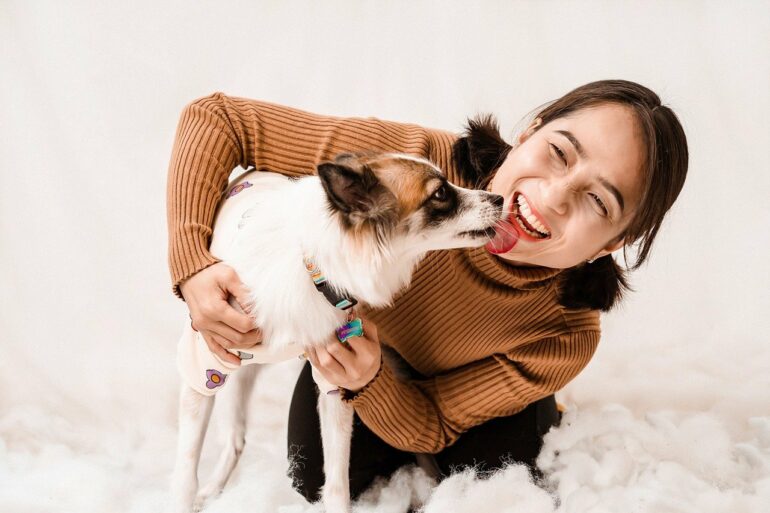With their wagging tails, floppy ears and boundless energy, dogs have secured their place as man's best friend. Among the many behaviors that endear them to us, one stands out as particularly heartwarming and, at times, puzzling: the act of licking. Why do dogs lick people? Let's dive deep into this canine behavior to unravel the mystery.
1. Sign of Affection
The most straightforward reason dogs lick people is to show affection. Just as humans might express their love through hugs or kisses, dogs use their tongues to do the same. Licking releases endorphins in dogs, giving them a sense of comfort and pleasure. When your dog licks you, it's their way of saying, "I love you." When they do this it's probably a good idea to give your dog a hug or kiss, because why not?
2. Communication and Bonding
Licking is one of the first sensations a puppy feels. Mother dogs lick their newborn pups to clean them and stimulate their breathing. As puppies grow, they lick their mothers to communicate hunger or to strengthen their bond. When dogs bring this behavior into human households, it shows trust and a desire for closeness.
3. Taste and Curiosity
Let's face it; humans can be salty. Our skin accumulates salt from sweat after a workout or on a hot day. Dogs might find this taste appealing. Beyond the salt, dogs are naturally curious creatures. Licking can be their way of exploring their environment and their people. Like us, dogs can can identify things that taste sweet, sour, salt or bitter.
4. Seeking Attention
Dogs are smart. They might continue the behavior if they've noticed that licking gets them positive or negative attention. Even being told off for excessive licking is preferable to being ignored for some dogs.
5. Instinctual Behavior
From an evolutionary standpoint, wild canines would lick the mouths of other pack members, especially when they returned from a hunt. I have trained cockapoo puppies and one of the cockapoo's behaviors is to come to me automatically for food. This behavior was a way of asking for food. While our domestic dogs don't need to beg for food in the same way, the behavior persists as a hardwired instinct.
6. Calming Mechanism
Licking can also serve as a self-soothing behavior for dogs. Just as humans might bite their nails or twirl their hair when anxious, dogs might lick to calm themselves down. If a dog licks excessively, it might be worth considering if an underlying stressor or anxiety triggers the behavior.
7. Health Concerns
While occasional licking is normal, excessive licking can indicate health issues. Dogs might lick to soothe a painful area, like an injury or an itch. Allergies, infections or skin conditions could be the culprits. If you notice your dog licking a specific area repeatedly, it's essential to consult with a veterinarian.
8. Healing Properties
Dogs have an instinctual behavior to lick their wounds. Saliva contains enzymes that can help destroy cell walls of dangerous bacteria. Additionally, the act of licking can help remove dirt and debris from a wound. When a dog licks a human, it might be their way of trying to offer some "healing assistance," especially if they sense or smell something is off.
9. Submission and Respect
In the wild, subordinate wolves and wild dogs would show submission to the dominant pack members by licking them around the mouth. This behavior is deeply ingrained in the canine psyche. When a dog licks a human, especially around the face, it might be displaying a submissive gesture, signaling that they acknowledge the person's higher status in the pack hierarchy.
10. Exploration and Learning
Dogs, especially puppies, explore the world with their mouths, just like human babies. Licking is a way for them to gather information about their surroundings. When they lick people, they're learning more about them—their scent, what they've recently eaten, where they've been and even their emotional state. Over time, as they gather more information through licking, dogs can often detect changes in their owner's health or mood, showcasing their incredible sensitivity and intuition.
Understanding and Managing Licking
While many people find occasional doggy kisses endearing, excessive licking can become problematic. Training and positive reinforcement can help manage and reduce unwanted licking. It's essential to understand the root cause of the behavior, whether it's anxiety, boredom or a health issue, to address it effectively.
Conclusion
Dogs have many reasons for licking people in their delightful and sometimes mysterious ways. Each lick tells a story, from showing affection and communicating to exploring their world.
Understanding the motives behind this behavior can strengthen our bond with our furry friends and ensure their well-being. After all, in every wet, slobbery lick, there's a tale of love, trust and millennia of evolution.






